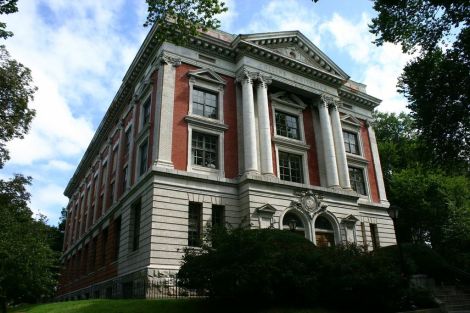
By Emily Horihan
In 1990, Congress required buildings to be accessible by passing the Americans with Disabilities Act (ADA). Fordham’s Rose Hill campus, scattered with buildings, old and new, has seen some changes in terms of accessibility in recent years. The campus is not yet entirely accessible, however.
Marco A. Valera, vice president for facilities management, listed a number of projects aimed at improving accessibility that are currently underway at Rose Hill. Valera cited the Loyola and Faber Hall renovations as current projects aimed at improving accessibility. “We’re adding additional ramps and a new elevator,” said Valera. Once renovations are completed, Loyola Hall is set to be the newly accessible home of the Manresa Scholars’ Program.
It is not just large-scale building renovations that make campus more accessible. Smaller projects can improve accessibility tremendously as well.
“In the summer, we will be doing sidewalk work,” said Valera. This work will include six new “curb cuts,” which are ramps carved into sidewalks to allow for greater wheelchair access.
Accessibility has improved on campus in recent years. The once winding staircase to the entrance of Walsh Library is now a ramp. The once inaccessible residence hall, Hughes Hall, is now the accessible home of the Gabelli School of Business. However, accessibility is lacking in one place where students see a great need: Collins Hall.
United Student Government has been a leader in the push for accessibility in Collins Hall.
“USG’s biggest contribution to accessibility causes over the past few years was our statement that the renovation of Collins Hall should be a priority for the university,” Kulangara said via email. However, as projects come and go on campus, Collins has remained the same.
Collins Hall contains the Collins Auditorium and the Blackbox Theater, which are both used frequently for on-campus theater productions. Many individuals, including students, faculty and Jesuits, are unable either to participate in or attend productions in the space due to lack of accessibility.
“Several Jesuits in Murray-Weigel Hall have shown concern that Collins is not handicap accessible,” Kulangara said. “Father Leonard, who restarted the Mimes and the Mummers after the club was disbanded during World War II, cannot attend the group’s shows because he is wheelchair-bound. We think that testimonies like these would strengthen the case for Collins’ renovations.”
Accessibility issues become more prominent when prospective students visit campus. Emily Rochotte, GSB ’14, USG’s outgoing vice president of Student Life, realized this while at the club fair during this year’s Spring Preview.
“It is very difficult talking to a wheelchair-bound prospective student about how she wants to be actively involved in theater at Fordham when knowing that Collins is not accessible,” said Rochotte.
When asked when will Collins be renovated, Valera said “At this point, it’s in the five-year plan.”
The renovation of Collins Hall should be a priority. The lack of accessibility to Collins keeps students and other members of the Fordham community from participating fully in an important aspect of campus culture.
Kulangara and Executive Vice President Sarah Skrobala, will continue pushing for the renovation of Collins, says Kulangara. They plan to draw their support from several places, as the lack of accessibility affects many individuals.
Fordham has made progress in terms of accessibility on campus and has done well to prioritize furthering accessibility in spaces where it is greatly needed, such as academic buildings and residence halls. The Fordham community, ranging from students to faculty to Jesuits, is looking for greater accessibility. Hopefully, its collaborative efforts will make a case for Collins Hall.
Emily Horihan, FCRH ’14, is an international studies major from Staten Island, N.Y.








































































































































































































